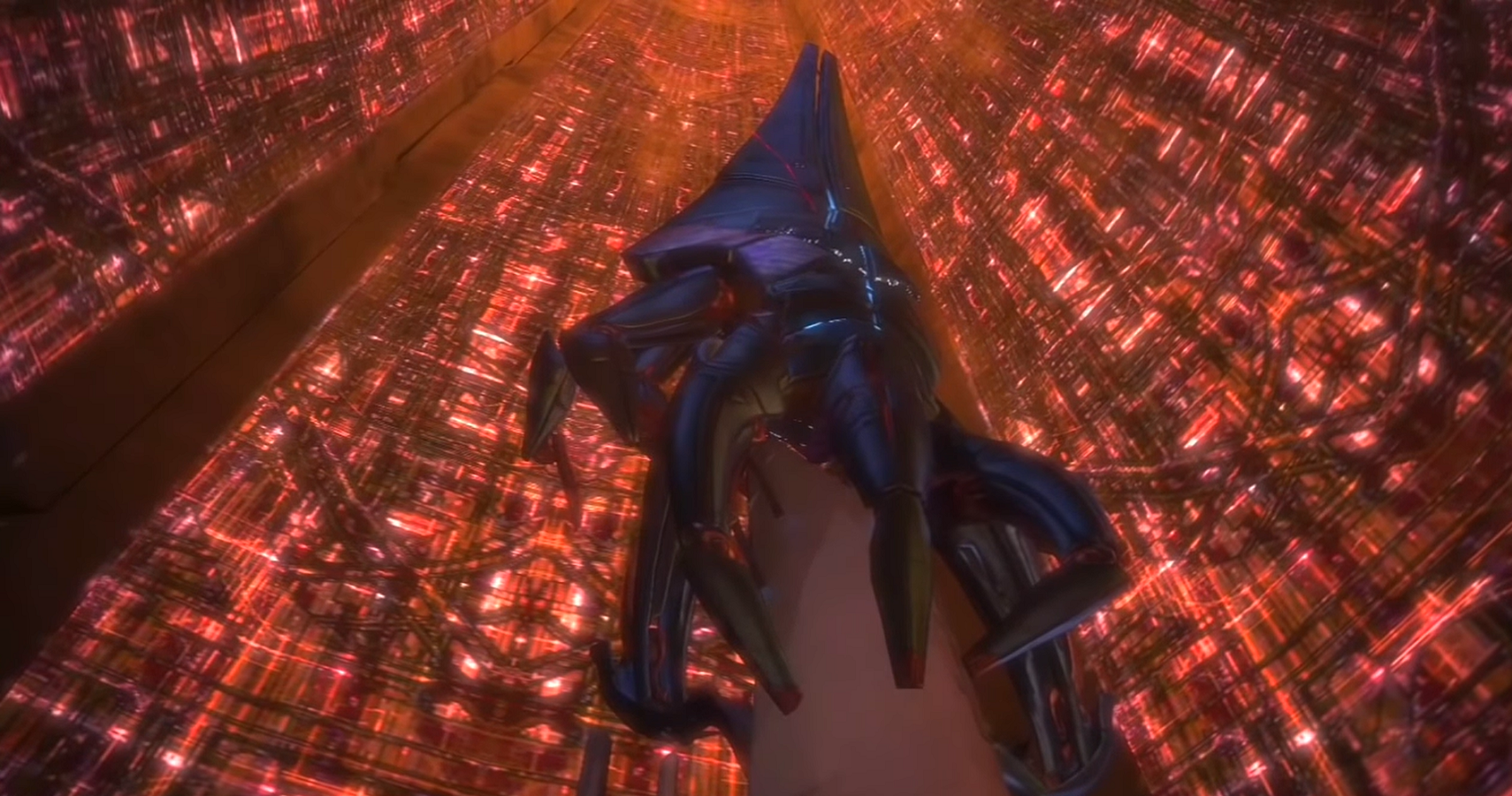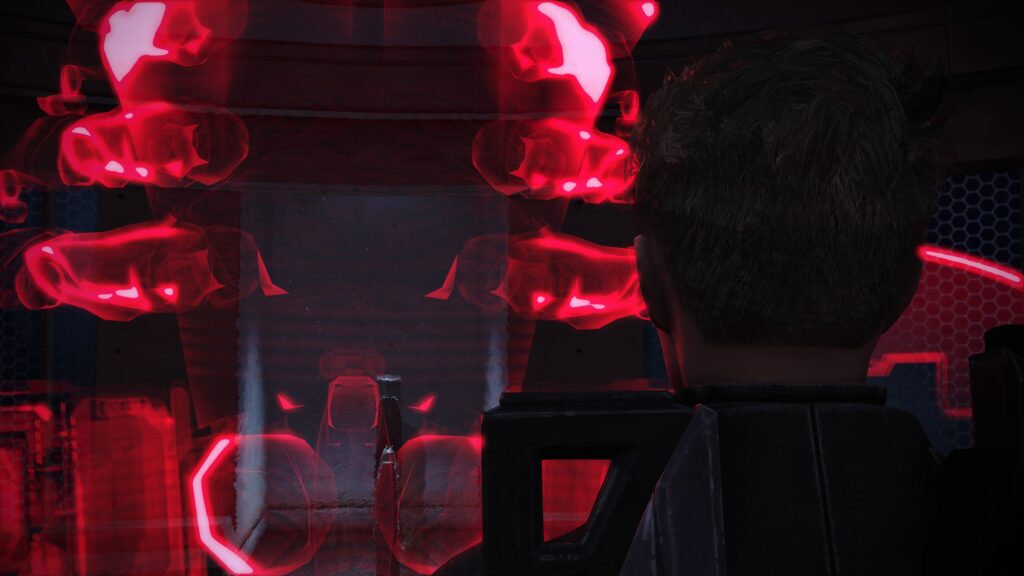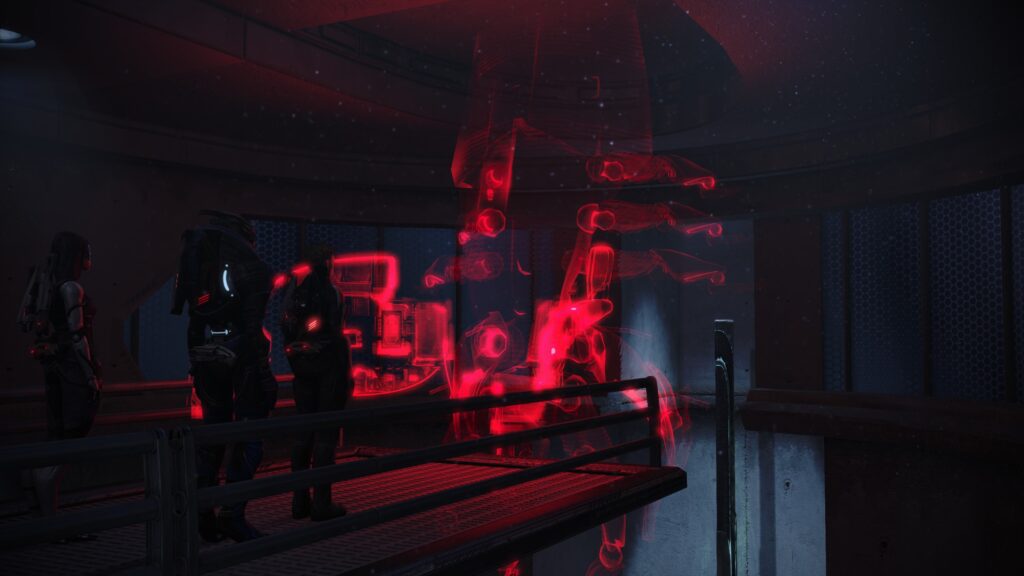Features
Great Moments in Gaming: Confronting Sovereign in Mass Effect
Sovereign’s true nature is finally laid bare….

Seasons don’t fear the Reapers.
War is looming, and the galaxy is on the brink of assimilation. Humanity stands alongside its allies to resist an encroaching threat from a race of sentient machines hell-bent on consuming or eradicating all organic life in their path; the task seems almost insurmountable in the face of the carnage the machines have wrought. A crew of exceptional individuals stands defiant against the oncoming annihilation, held strong together by their unflappable leader. Equal parts diplomat and soldier, this peerless leader meets the living machines in battle with the aid of their comrades from around the galaxy. The fate of all sentient races hangs in the balance. It’s victory or extinction.
But enough about Captain Picard and the Borg; we’re here to talk about Mass Effect.
Rewind with me, if you will, to the increasingly distant past of 2007. Coming off of strong showings with Baldur’s Gate and Star Wars: Knights of the Old Republic, Canadian developer BioWare was looking to take a bold step out of D&D-style old-school RPGs and into the realm of sci-fi blockbusters. Finding a pleasant middle-ground between their RPG roots and a more action-oriented third-person shooter, their operatic space epic Mass Effect combined accessible cover-based gunplay (popularized a year prior with Gears of War) with BioWare’s signature knack for writing and excellent world building.
Anyone who has played Mass Effect over the past 15 years can attest to its staying power, and that kind of longevity doesn’t come easy in such a competitive and rapidly changing industry. Remaining such a staple of the gaming zeitgeist is emblematic of something undeniably special. We all have moments that define our experience with the games we love, and Mass Effect has quite the laundry list to consider. From our encounter with the Rachni Queen to the frantic zero-gravity firefights on the exterior of the Citadel, BioWare’s flair for cinematic storytelling had come to fruition.
Amidst all of Mass Effect’s highlights, few measure up to Virmire’s Lovecraftian twist as Commander Shepard and friends finally come face to face with the enigmatic Sovereign.

Thought initially to be a massive warship for Saren to utilize in his crusade, Sovereign’s true nature is finally laid bare as the assault on Virmire builds to its climax. After locating a Prothean beacon within Saren’s facility, Shepard’s mind is assailed with yet another apocalyptic vision akin to what she saw on Eden Prime. After taking a moment to recover from the ordeal, we notice that the room we’re standing in has adopted an ominous red glow emanating from a holographic image near the beacon. As Shepard approaches, a holographic likeness of Sovereign fades into focus, and a thunderous voice shatters the silence.
“You… are not Saren.”
Every word feels massive; a low roar that seems to shake the earth. Tali ponders if what we’re seeing is simply a VI interface, a theory which Sovereign himself quickly puts to rest. This is where Mass Effect turns the corner; we’re no longer in just another sci-fi adventure game, we’ve crossed over into full blown Lovecraftian cosmic horror. Sovereign claims that his existence surpasses our understanding, and that his very being is unfathomable to us “rudimentary creatures of blood and flesh.” Shepard realizes the gravity of Sovereign’s cryptic divulgence: Sovereign isn’t Saren’s warship, he is one of the fabled Reapers.
“Reaper… A label created by the Protheans to give voice to their destruction. In the end, what they chose to call us is irrelevant. We simply… are.”
He claims that his kind predates even the Protheans, and that this cycle of extinction that has been set in motion has occurred countless times before. Sovereign’s reasoning for these cullings is vague and ultimately nebulous; organic life is merely a resource to be harvested to whatever ends the Reapers choose. Humanity (and every other race, for that matter) is nothing more to the Reapers than a swarm of cuttlefish to a feeding whale.

This is where BioWare shows its hand in terms of making its Lovecraftian influence apparent. In Lovecraft, horror doesn’t come from Cthulu’s anger or bloodlust towards us, it comes from his complete and total indifference. His existence is beyond reckoning to us, and our existence does not register to him. Where does he come from? What is he? We don’t know, and we can’t know. The dread is existential as we realize how small and insignificant we are on a grander scale; a mote of dust in a vast cosmic sea. The vastness of the unknown.
In Shepard’s conversation with him on Virmire, Sovereign and the Reapers embody these same principles. Why is he here? Why are the Reapers wiping out organic life? We’re left with no answers. The nature of their existence is beyond comprehension, and their motives seem almost utilitarian on a cosmic scale. Why do they wipe the galaxy clean? Because they just… do. They are simply a function of the universe. They don’t hunt us with malice or hatred, their eradication is cold and indifferent, akin to pulling weeds. It doesn’t matter if it’s Humanity, Asari, the Protheans, or the myriad of races that pre-date the known races in-game; they are all victims to the same cold cycle of cosmic calamity.
“We have no beginning, we have no end. We are infinite. Millions of years after your civilization has been eradicated and forgotten, we will endure.”

Saren, the game’s supposed main villain to this point, has now been usurped by something far more nefarious. As we discover in our confrontation with Saren at the end of Virmire, he serves as little more than a puppet to Sovereign’s will. A manhunt for a rogue Spectre has suddenly shifted into a galactic fight for existence, and the narrative transition is as drastic as it is well-executed. Shepard tells Sovereign that organic life won’t go quietly, though her challenge seems to make little impact. Sovereign’s final address rings ominously as he severs communication:
“Your words are as empty as your future. I am the vanguard of your destruction.”
The hologram goes dark. All that remains is a foreboding uneasiness as we come to grips with the inevitable annihilation that Sovereign promises is looming in the dark space beyond the stars. They are impartial, cold, and unfeeling. They cannot be reasoned with, and their motives are beyond our understanding. They are the unknown, and there is no fear more primal than that of the unknown.
This type of horror is an incredibly high concept and exceedingly difficult to achieve successfully. In terms of gaming, the list of titles that manage to pull off this kind of dread is brutally short. Aside from Mass Effect, FromSoftware’s Bloodborne is the most apparent example both aesthetically and thematically, and the Dark Souls series in general also leans heavily into the larger themes of insignificance in the face of unavoidable entropy. While Bloodborne may nail the cosmic horror on a scale that BioWare couldn’t quite reach with Mass Effect, that comparison may be a tad unfair given that Bloodborne is basically “Lovecraft: The Game.”
The fact that a commercially accessible triple-A sci-fi blockbuster had the moxie to make their mid-game twist a hard right turn into high concept cosmic horror is nothing short of praiseworthy, doubly so that they succeeded. The first Mass Effect is certainly a bumpy ride (quite literally in its numerous vehicle sections), but its peaks represent BioWare at the top of their craft. Shepard’s confrontation with Sovereign is a legitimate achievement that sets the tone impeccably for the remainder of the series.
And if all this doom and gloom about our insignificance in the universe has soured your mood, we’ll leave you with Renegade Shepard being a real jerk to the Hanar. Misery loves company.

-

 Features4 weeks ago
Features4 weeks agoGet Ready: A Top Isekai Anime from the 2020s Is Headed to Hulu!
-

 Features4 weeks ago
Features4 weeks agoSocial Gaming Venues and the Gamification of Leisure – A New Era of Play
-

 Features4 weeks ago
Features4 weeks agoSolo Leveling Snubbed?! You Won’t Believe Who Won First at the 2025 Crunchyroll Anime Awards!
-

 Culture4 weeks ago
Culture4 weeks agoThe Global Language of Football: Building Community Beyond Borders
-

 Technology2 weeks ago
Technology2 weeks agoGamification and Productivity: What Games Can Teach SaaS Tools
-

 Features2 weeks ago
Features2 weeks agoThis Upcoming Romance Anime Might Just Break the Internet; Trailer Just Dropped!
-

 Features5 days ago
Features5 days agoDon’t Watch These 5 Fantasy Anime… Unless You Want to Be Obsessed
-

 Features3 weeks ago
Features3 weeks agoFarewell to a Beloved 13-Year-Old Isekai Anime That Brought Us Endless Laughter
-

 Features3 weeks ago
Features3 weeks agoWait, What?! Tom & Jerry Just Turned Into an Anime and It’s Glorious!
-

 Culture3 weeks ago
Culture3 weeks agoIs the Gaming Industry Killing Gaming Parties?
-

 Game Reviews3 weeks ago
Game Reviews3 weeks agoCall of Duty and the Myth of Military Realism: Tactical or Just Tacticool?
-

 Technology3 weeks ago
Technology3 weeks agoDigital Cash: For Gamers Who Don’t Ask Permission?























